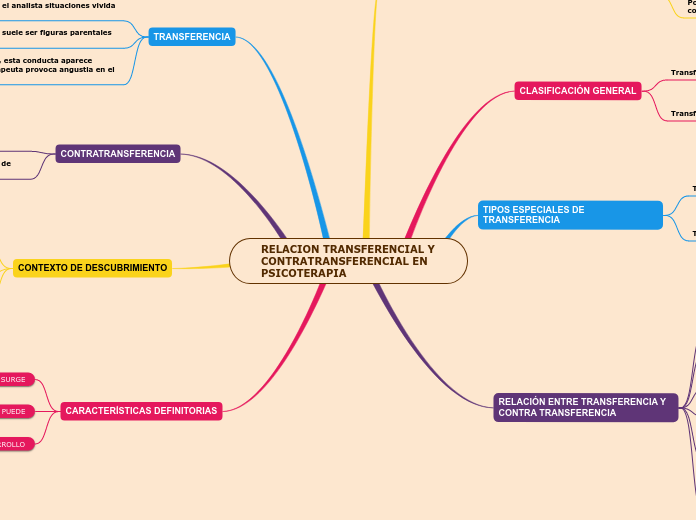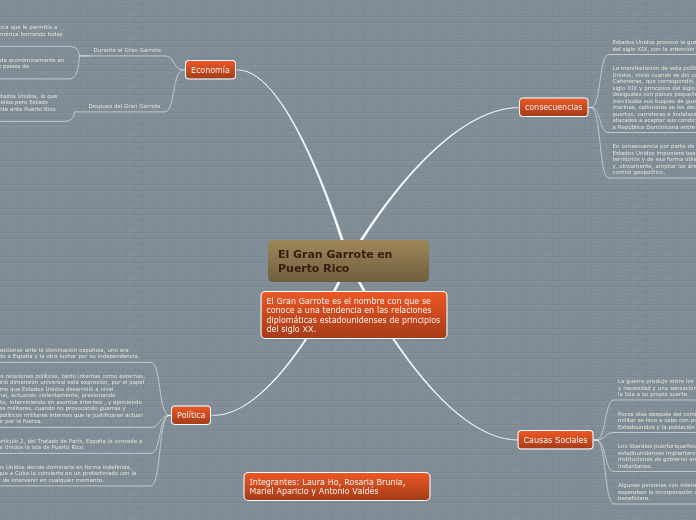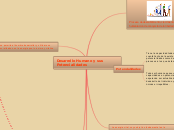RELACION TRANSFERENCIAL Y CONTRATRANSFERENCIAL EN PSICOTERAPIA
Type in the name of the book you have read.
CARACTERÍSTICAS DEFINITORIAS
Type the main events of the book, classifying them in: events from the beginning, events from the middle, and events from the end of the book.
Describe the story visually. Add a representative picture for each of them.
DESARROLLO
Se desarrolla en una relación que es asimétrica porque psicoanalista y paciente.
PUEDE
Transferirse a su figura la idea de una madre amorosa, una madre juiciosa y punitiva, etc.
SURGE
En un espacio muy concreto, en el espacio psíquico del paciente.
CONTEXTO DE DESCUBRIMIENTO
In contrast to the main idea, the theme is the message, lesson or moral of the book.
Some tips to find out the theme of the book easier:
- Try to find it while you are reading. It may be stated or implied.
- Think about how the characters reacted to obstacles.
- Think about the important decisions that the characters made.
- Think about the characters growing or changing throughout the book.
Se utilizó en 1895 a través de las asociaciones verbales
Se descubrió en el tratamiento de la paciente de Breuer Anna
Su descubrimiento es atribuible a Freud
CONTRATRANSFERENCIA
Algunos lo definen como la capacidad de empatía, antipatía u otros afectos
Sucede cuando el psicólogo transfiere situaciones pasadas en el paciente
Take notes while you read the book. Write here your favorite quotes from the book.
TRANSFERENCIA
Take notes while you read the book. Type here the resources, books, or websites that the author mentioned and you want to check out later.
Según Rogers, esta conducta aparece cuando el terapeuta provoca angustia en el sujeto
Por lo general suele ser figuras parentales de la infancia
Para Freud es la relación analítica en la cual el evaluado transfiere en el analista situaciones vivida en el pasado
RELACIÓN ENTRE TRANSFERENCIA Y CONTRA TRANSFERENCIA
Es importante tener en cuenta un modelo integrativo, modelo BIO-PSICO-SOCIAL,
La transferencia contempla dos sentidos
Cuando los sucesos típicos que vive el ser humano es interpretado por cada uno de manera única
Cuando las experiencias pasadas tienen una influencia fundamental en el presente
Se reviven recuerdos pasados a la actualidad a través de reediciones
Ambos son un término fundamental del psicoanálisis. Permite que el inconsciente se muestre libremente.
Hay influencia positiva y negativa.
Hay influencia del terapeuta sobre el paciente, paciente sobre terapeuta; ya que están en una relación interactiva.
The main idea is what the book is mostly about.
Some tips to find out the main idea of a book easier:
- Read the title.
- Look for the text features.
- Figure out if you are reading a fiction or a non fiction book.
- Think about some examples that support this idea.
TIPOS ESPECIALES DE TRANSFERENCIA
Type the names of the book characters. Start with the main character.
Draw arrows to represent the relationship between them and if it is possible write on them what they represent for each other (if they are relatives, friends, lovers, enemies etc.)
Transferencia psicótica
Son situaciones transferenciales donde el terapeuta siente que el paciente no tendrá buena relación con él o es una relación ambivalente, incluso puede ser sádico y castradora
Transferencia erotizada
Se identificará la alta intensidad, cesa el trabajo analítico, hay perturbación del sentido de la realidad, entre otros.
What are the characteristics that best describe the character? Type them here.
CLASIFICACIÓN GENERAL
What is the reason why the author wrote the book?
Transferencia Negativa
Movilización de sentimientos hostiles-eróticos, da naturaleza primitiva, que en la forma más extrema, llevaría a la paranoia.
Transferencia Positiva
Se presenta desde un inicio del proceso, donde se manifestará la alianza terapéutica y se manifestará la intensificación del interés del paciente.
TRANFERENCIA Y REPETICIÓN
Who is the author of the book? Type in his/her name.
Compulsión de repetición
Por otro lado, la transferencia tiene que ver con la resistencia y resistido
Se reactivan hechos y/o pensamientos del pasado, queriendo realizarlo en el presente y satisfacer pulsiones reprimidas.









